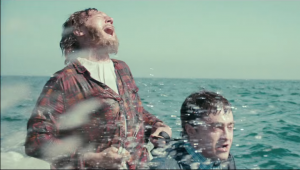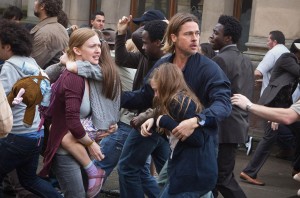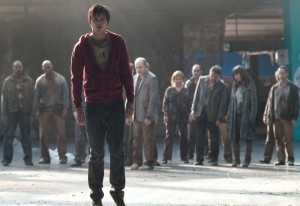Hang on for the ride in this insanely surreal comedy-drama
As we were walking into Swiss Army Man, I discovered that my friend Adam, who I’d brought to the movie, didn’t know anything about what we were about to see. I giggled, because I knew that the movie was about a guy stranded on a deserted island who befriends a farting corpse. Adam was going to be very surprised. Ten minutes into the film, he whispered, “What the hell? This is like Weekend at Bernie’s.” To which I responded, “Crossed with Castaway!” But the film is a lot more than being the bastard child of a low-rent ‘80s comedy about two men who cart around the dead body of their boss claiming he’s alive and a high-brow Tom Hanks drama about survival and the meaning of life. Yes, it’s as bizarre and puerile as Bernie’s and aspires to Castaway’s depth; Swiss Army Man uses the insanity of its premise to create a powerfully symbolic fever dream about the power of friendship to heal the wounds of a lifetime of loneliness.
The film opens with a disheveled, dejected Hank, played by a brilliantly sensitive Paul Dano, alone on a small island in the middle of the ocean, where he is setting up a ramshackle noose with which to hang himself. As he is getting the courage to commit suicide, he sees a man wash ashore. He almost kills himself rushing to the figure, who turns out to be both dead and played by Daniel Radcliffe (continuously ballsy in his post-Harry Potter choices). Depressed once again, Hank almost goes through with the hanging before he notices something odd about the corpse: it’s farting, and it’s farting a great deal. In fact, its farts are so powerful that they can propel the body like a jet ski. The opening credits roll as Hank rides the corpse across the waves and swells, screaming in joy. (This is when I looked over at Adam and saw his jaw drop.)
Hank wakes up on the shore of what looks like the mainland. He has become emotionally attached to his corpse, so he drags it behind him as he wanders through the garbage-strewn forest, searching for water and food and civilization – and the object of Hank’s affection, played mostly in flashback by Mary Elizabeth Winstead. One morning, desperately thirsty, he discovers that in addition to being a fart engine, the corpse is also a water pump – push his stomach and seemingly clean water spouts from his mouth. And then the corpse wakes up. Because at this point, why not? He can’t really move and can only barely talk and remembers nothing of being alive, but he takes the name Manny and joins Hank on his mission. As Hank teaches him about manners (like not farting in front of people) and women (which leads to Manny’s nearly magical erections), they become epically close friends.
Writer-directors Dan Kwan and Daniel Scheinert were best known prior for their insane, ground-breaking, and now iconic video for Turn Down the What, which has been seen over 500 million times on YouTube. Swiss Army Man is their first narrative feature, and it takes their bonkers and quite original aesthetic and wraps it around a somewhat traditional buddy comedy. In some ways, the script, which is often as sweet as it is ribald, goes to expected places, and then it veers into places where I was shocked to arrive. I was moved but I was also disappointed when the Daniels’ (as they’re known) didn’t fully embrace the queerness that they worked hard to set up. I think most viewers who sat through the whole film will cheer the ending, but I was left a little dejected by the Daniels’ embrace of traditional heterosexism in a film as deliriously iconoclastic as Swiss Army Man.
Swiss Army Man
Written and Directed by Dan Kwan and Daniel Scheinert
Starring Paul Dano, Daniel Radcliffe and Mary Elizabeth Winstead
Rated R
Originally published in LGBT Weekly


